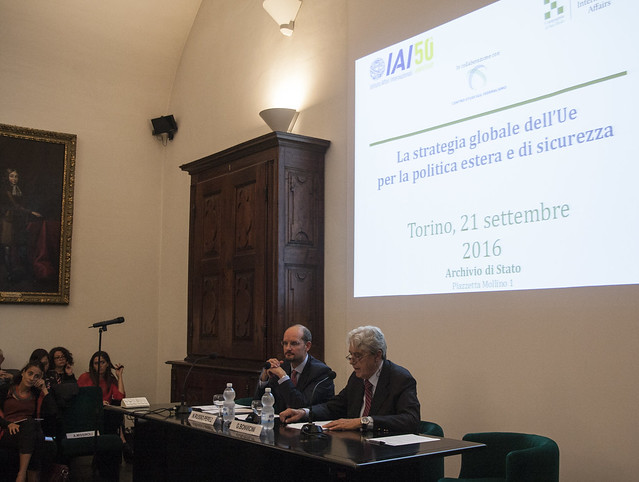A Global Strategy for the European Union’s Foreign and Security Policy
A high-level conference examining the EU’s Global Strategy (EUGS) was held in Turin on 21 September 2016. Organised by the Istituto Affari Internazionali (IAI) and the Compagnia di San Paolo International Affairs Programme, in cooperation with the Centro Studi sul Federalismo (CSF), participants debated the Global Strategy document presented by EU High Representative Federica Mogherini at the European Council of 28 June 2016.
The new Strategy document is the product of a long consultation process involving EU Member States and institutions, as well as a large number of representatives from universities, think tanks, foundations, NGOs, business associations, unions and religious institutions.
Three of the principal contributors to the EUGS document took part in the conference: Nathalie Tocci (Special Advisor to High Representative Mogherini and Deputy Director of the Rome-based IAI), Antonio Missiroli (Director of the European Union Institute for Security Studies (EUISS) in Paris), and Alfredo Conte (Head of the Strategic Planning Division of the European External Action Service (EEAS) in Brussels).
Nathalie Tocci began by outlining the reasoning behind the EUGS document, that effectively replaces the European Security Strategy. The world has changed significantly since latter document was presented in 2003, becoming more complex, contested and interconnected. The needs and interests of European citizens have also changed, especially in the security realm. The EUGS takes stock of these changes and seeks to react to this new strategic environment by adopting an approach of “principled pragmatism”, based on: the respect of democratic values within EU institutions and its Member States as the primary instrument of their international promotion; more flexible partnerships between the EU and other international actors; and a renovated multilateralism to allow the EU to reach its full potential on the international scene.
During the informal summit of the EU heads of state or government held in Bratislava on 16 September 2016, more common ground for further initiatives inspired by the EUSG have emerged. This political convergence should be reaffirmed in the coming months before the expected implementation plan of the EUGS on which the High Representative is already working.
Lastly, the panellists pointed out how the objective for the near future is not the creation of a common EU army but rather the establishment of security and defence structures at the EU level and the launch of common initiatives among a core group of Member States in order to ensure the security of the European citizens and to increase the EU’s strategic autonomy from other international security providers such as the US or NATO.



